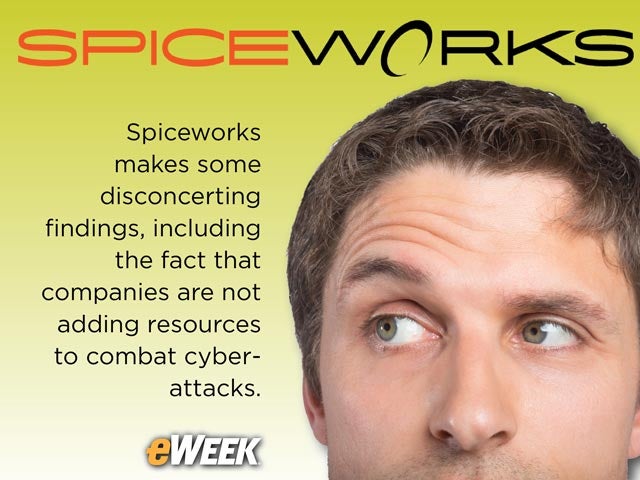eWEEK content and product recommendations are editorially independent. We may make money when you click on links to our partners. Learn More.
110 Eye-Opening Findings From Spiceworks’ 2016 State of IT Report
2IT Spending Is Up Modestly in 2016
The average company is spending $293,094 on IT hardware, software and services this year, up from around $291,000 in 2015, according to the report. Naturally, budgets vary based on a company’s size, with firms of up to 20 employees spending an estimated $62,517 while major enterprises with more than 2,500 employees will spend more than $2.3 million this year.
3How IT Budgets Are Changing in 2016
More than four in 10 companies say that they will not modify their IT budgets this year, despite increasing security risks. Even more surprisingly, 10 percent of companies say that their IT budgets are lower in 2016 compared with 2015. Worst of all, 11 percent of IT professionals don’t even know what their IT budgets are for 2016.
4Companies Are Holding the Line on IT Hiring
With so little change to budgets, it’s perhaps no surprise that Spiceworks is forecasting a rather disappointing job market. The company found that 59 percent of companies will see no change to their IT staff this year, while 4 percent of respondents say they’ll cut some staff. About one-third of the respondents said their organizations will increase IT staff this year.
5Companies Are More Willing to Spend on Hardware
As with 2015, hardware projects will get the highest allocation in 2016, accounting for 37 percent of a company’s IT budget. According to Spiceworks, 21 percent of those funds will go to desktops and another 19 percent to servers. Laptops, networking hardware and external storage will also attract some spending this year.
6Software Will Consume One-Third of IT Spending
Companies will also spend heavily on software. In fact, 31 percent of IT budgets will be allocated to software in 2016. Companies will spend 15 percent of budget on virtualization, operating systems and productivity platforms, combining for nearly half of total software budgets. IT professionals also expect to buy CRM, data backup and database software this year. Security spending will account for just 9 percent of total software budgets.
7Spending on Cloud Services Is Rising
Although total hardware and software spending will account for less of IT budgets this year, it’s quite the opposite in the cloud. Spiceworks says 14 percent of IT budgets will be used on cloud services, compared with 12 percent in 2015. With that cash, companies will be spending on email hosting, Web hosting and online data backup services, among others.
8Why Are Companies Buying?
So, what’s prompting all of this buying? According to Spiceworks, two-thirds of companies are eyeing new purchases due to end-of-life issues. That’s followed by 64 percent of companies that plan to invest in new technology due to growth and 57 percent that attributed the spending to technology refresh cycles. Just one quarter of respondents said they’re buying solutions for “new technology features.”
9IT Professionals Worry About Inadequate Security
The view IT professionals have on their corporate security is scary, if nothing else. Approximately half of respondents say that their IT assets are not “adequately protected” and that “IT security isn’t a top priority this year.” A whopping 62 percent of companies don’t perform regular security audits. One other shocking finding is that 74 percent of IT professionals say that the major data breaches they hear about in the news haven’t made them change any of their security practices.
10What the Future Holds
Looking ahead, 85 percent of IT professionals say that they either use or will use server virtualization services. That was followed by 57 percent of respondents who said they employ or desire BYOD solutions and 55 percent of IT professionals who have or want “advanced security solutions.” Interestingly, just 3 percent of respondents say they want a software-defined network or desktop as a service.
11What’s on IT Professionals’ Wish Lists?
Spiceworks asked IT professionals about their most important IT systems or services needs as they look to the future. Security topped more than three-quarters of respondents’ list, followed by networking, at 70 percent. Storage, software and hardware were also viewed as critical to the future. BYOD was at the bottom of the list, with just 32 percent of IT professionals saying it was important to their future business practices.










